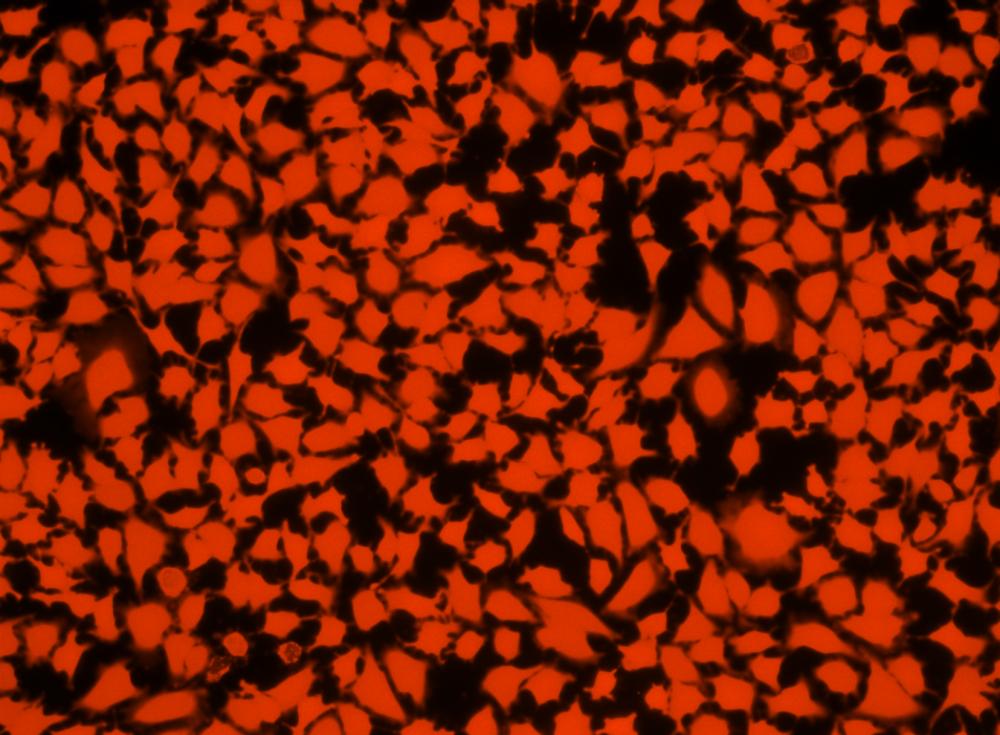红色荧光示踪探针 CytoTrace CFDA
| Ex (nm) | 562 | Em (nm) | 576 |
| 分子量 | 652.43 | 溶剂 | DMSO |
| 存储条件 | 在零下15度以下保存, 避免光照 |
CytoTrace 红色荧光探针保留了Cy3 / TRITC的光谱特性,因此可以使用荧光显微镜或流式细胞仪轻松检测其信号。它自由地穿过细胞膜,并在与细胞成分反应后转化为不渗透细胞的产物。细胞不渗透的反应产物经过数代传给子细胞,但没有转移到群体中的相邻细胞。装有CytoTrace Red探针的细胞通常可以发出荧光,并且至少可以存活24小时,这使该探针成为了出色的长期细胞示踪剂。染色图案可以用甲醛或戊二醛固定,用于信号放大和其他应用。它的光谱与GFP或FITC标记的抗体的光谱很好分离。
操作步骤
该协议仅提供指南,应根据您的特定需求进行修改。
1.准备2-10 mMDMSO储备溶液
对于#22014添加45微升DMSO成50 μ 克小瓶使2mM的储备溶液(1毫克/毫升,相当于1.8毫摩尔);
对于#22015添加36微升DMSO成50 μ 克小瓶制成10mM储备溶液(1毫克/毫升,相当于1.46毫摩尔);
对于#22016,添加153 uL ml DMSO以制成10 mM储备溶液(1 mg / ml相当于1.53 mM);
对于#22017,添加215μLDMSO以制成10 mM储备溶液(1 mg / ml相当于2.15 mM);
对于#22020,将4.2 mg溶于1 ml DMSO中制成10 mM储备溶液(1 mg / ml相当于〜2.4 mM);
注意:储备溶液应及时使用;应将所有剩余的溶液等分并在< -20 o C下冷冻。避免重复冻融循环,并避光
2.准备染料工作液
在使用前,通过用Hanks和20 mM Hepes缓冲液(HHBS)或您选择的pH 7缓冲液稀释步骤1中的DMSO储备溶液,准备好1至20 µM的染料工作溶液。
3.用流式细胞仪或荧光显微镜分析细胞:
3.1用测试化合物处理细胞所需的时间。
3.2离心细胞,每管得到2-10 x105细胞。
3.3将细胞重悬于500 µL 的染料工作溶液中(来自步骤2)。
3.4将细胞与染料溶液在室温或37° C下避光放置15至30分钟。
3.5从细胞中除去染料工作溶液,用HHBS或您选择的缓冲液洗涤细胞。将细胞重悬于500 µL预热的HHBS或培养基中,每管可得到2-10 x 10 5个细胞。
3.6用流式细胞仪(FL1通道) 或荧光显微镜监测Ex / Em = 490/520 nm处的荧光变化。
注意:对于细菌细胞染色:将母液在通过测试细菌过夜生长而预先调节的营养肉汤中以1:800的比例稀释时,染色是有效的,但是也可以使用新鲜的营养肉汤或PBS。细菌悬浮液应用PBS稀释至105 - 10 7每毫升。将1 ml溶液加到.45 µm过滤器(25mm)上并真空过滤除去溶液,然后加入1ml染料溶液并在室温下孵育5-10分钟,即可对细菌染色。
参考文献
Fluorescence-Based Transport Assays Revisited in a Human Renal Proximal Tubule Cell Line
Authors: Caetano-Pinto P, Janssen MJ, Gijzen L, Verscheijden L, Wilmer MJ, Masereeuw R.
Journal: Mol Pharm (2016): 933
The variable chemotherapeutic response of Malabaricone-A in leukemic and solid tumor cell lines depends on the degree of redox imbalance
Authors: Manna A, De Sarkar S, De S, Bauri AK, Chattopadhyay S, Chatterjee M.
Journal: Phytomedicine (2015): 713
Cell membrane tracker based on restriction of intramolecular rotation
Authors: Zhang C, Jin S, Yang K, Xue X, Li Z, Jiang Y, Chen WQ, Dai L, Zou G, Liang XJ.
Journal: ACS Appl Mater Interfaces (2014): 8971
A multiple model probability hypothesis density tracker for time-lapse cell microscopy sequences
Authors: Rezatofighi SH, Gould S, Vo BN, Mele K, Hughes WE, Hartley R.
Journal: Inf Process Med Imaging (2013): 110
Evaluation of stability and sensitivity of cell fluorescent labels when used for cell migration
Authors: Beem E, Segal MS.
Journal: J Fluoresc (2013): 975
TLM-Tracker: software for cell segmentation, tracking and lineage analysis in time-lapse microscopy movies
Authors: Klein J, Leupold S, Biegler I, Biedendieck R, Munch R, Jahn D.
Journal: Bioinformatics (2012): 2276
Horizontal DNA transfer from donor to host cells as an alternative mechanism of epithelial chimerism after allogeneic hematopoietic cell transplantation
Authors: Waterhouse M, Themeli M, Bertz H, Zoumbos N, Finke J, Spyridonidis A.
Journal: Biol Blood Marrow Transplant (2011): 319
The exocytosis of fluorescent nanodiamond and its use as a long-term cell tracker
Authors: Fang CY, Vaijayanthimala V, Cheng CA, Yeh SH, Chang CF, Li CL, Chang HC.
Journal: Small (2011): 3363
The interplay between Leishmania promastigotes and human Natural Killer cells in vitro leads to direct lysis of Leishmania by NK cells and modulation of NK cell activity by Leishmania promastigotes
Authors: Lieke T, Nylen S, Eidsmo L, Schmetz C, Berg L, Akuffo H.
Journal: Parasitology (2011): 1898
Cell electrofusion visualized with fluorescence microscopy
Authors: Trontelj K, Usaj M, Miklavcic D.
Journal: J Vis Exp. (2010)






